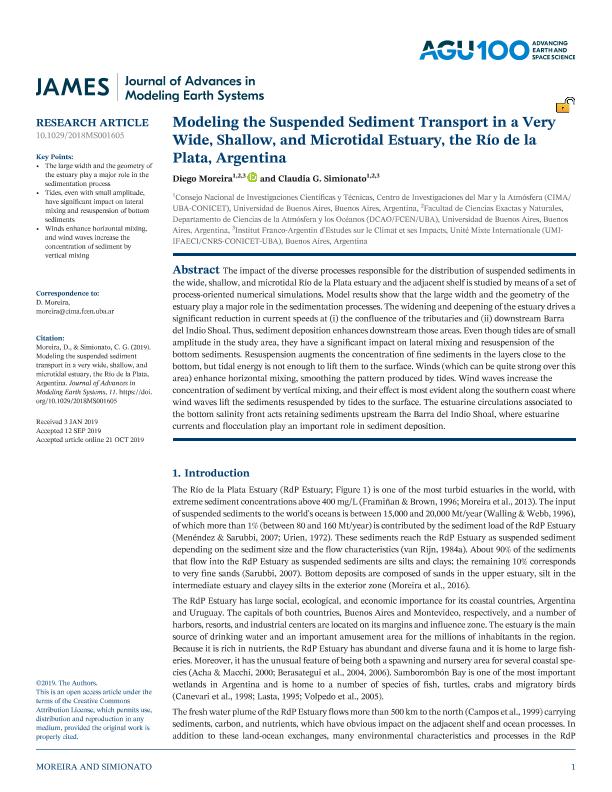Mostrar el registro sencillo del ítem
dc.contributor.author
Moreira, Diego

dc.contributor.author
Simionato, Claudia Gloria

dc.date.available
2021-01-22T12:12:06Z
dc.date.issued
2019-10
dc.identifier.citation
Moreira, Diego; Simionato, Claudia Gloria; Modeling the Suspended Sediment Transport in a Very Wide, Shallow, and Microtidal Estuary, the Río de la Plata, Argentina; Blackwell Publishing; Journal of Advances in Modeling Earth Systems; 11; 10; 10-2019; 3284-3304
dc.identifier.issn
1942-2466
dc.identifier.uri
http://hdl.handle.net/11336/123439
dc.description.abstract
The impact of the diverse processes responsible for the distribution of suspended sediments in the wide, shallow, and microtidal Río de la Plata estuary and the adjacent shelf is studied by means of a set of process-oriented numerical simulations. Model results show that the large width and the geometry of the estuary play a major role in the sedimentation processes. The widening and deepening of the estuary drives a significant reduction in current speeds at (i) the confluence of the tributaries and (ii) downstream Barra del Indio Shoal. Thus, sediment deposition enhances downstream those areas. Even though tides are of small amplitude in the study area, they have a significant impact on lateral mixing and resuspension of the bottom sediments. Resuspension augments the concentration of fine sediments in the layers close to the bottom, but tidal energy is not enough to lift them to the surface. Winds (which can be quite strong over this area) enhance horizontal mixing, smoothing the pattern produced by tides. Wind waves increase the concentration of sediment by vertical mixing, and their effect is most evident along the southern coast where wind waves lift the sediments resuspended by tides to the surface. The estuarine circulations associated to the bottom salinity front acts retaining sediments upstream the Barra del Indio Shoal, where estuarine currents and flocculation play an important role in sediment deposition.
dc.format
application/pdf
dc.language.iso
eng
dc.publisher
Blackwell Publishing

dc.rights
info:eu-repo/semantics/openAccess
dc.rights.uri
https://creativecommons.org/licenses/by/2.5/ar/
dc.subject
ESTUARIES DYNAMICS
dc.subject
HYDRO-SEDIMENTOLOGICAL MODELING
dc.subject
RÍO DE LA PLATA ESTUARY
dc.subject
SEDIMENT TRANSPORT
dc.subject
SEDIMENTOLOGICAL PROCESSES
dc.subject
SUSPENDED SEDIMENT
dc.subject.classification
Oceanografía, Hidrología, Recursos Hídricos

dc.subject.classification
Ciencias de la Tierra y relacionadas con el Medio Ambiente

dc.subject.classification
CIENCIAS NATURALES Y EXACTAS

dc.title
Modeling the Suspended Sediment Transport in a Very Wide, Shallow, and Microtidal Estuary, the Río de la Plata, Argentina
dc.type
info:eu-repo/semantics/article
dc.type
info:ar-repo/semantics/artículo
dc.type
info:eu-repo/semantics/publishedVersion
dc.date.updated
2020-11-13T20:44:10Z
dc.journal.volume
11
dc.journal.number
10
dc.journal.pagination
3284-3304
dc.journal.pais
Estados Unidos

dc.description.fil
Fil: Moreira, Diego. Consejo Nacional de Investigaciones Científicas y Técnicas. Oficina de Coordinación Administrativa Ciudad Universitaria. Centro de Investigaciones del Mar y la Atmósfera. Universidad de Buenos Aires. Facultad de Ciencias Exactas y Naturales. Centro de Investigaciones del Mar y la Atmósfera; Argentina. Instituto Franco-argentino sobre Estudios del Clima y sus Impactos; Argentina
dc.description.fil
Fil: Simionato, Claudia Gloria. Consejo Nacional de Investigaciones Científicas y Técnicas. Oficina de Coordinación Administrativa Ciudad Universitaria. Centro de Investigaciones del Mar y la Atmósfera. Universidad de Buenos Aires. Facultad de Ciencias Exactas y Naturales. Centro de Investigaciones del Mar y la Atmósfera; Argentina. Instituto Franco-argentino sobre Estudios del Clima y sus Impactos; Argentina
dc.journal.title
Journal of Advances in Modeling Earth Systems
dc.relation.alternativeid
info:eu-repo/semantics/altIdentifier/doi/https://doi.org/10.1029/2018MS001605
Archivos asociados
